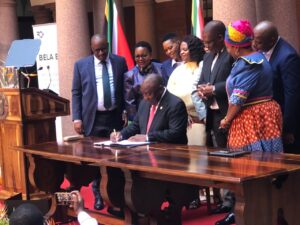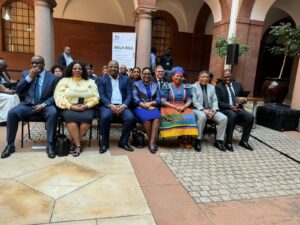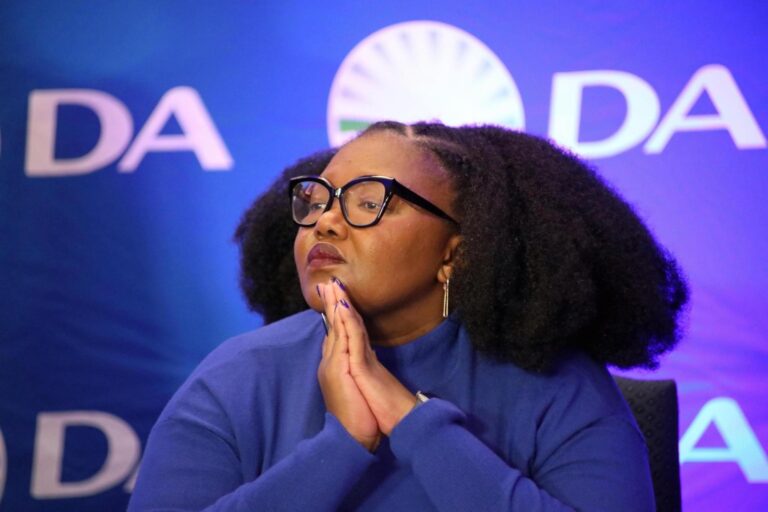
Tensions Rise as DA Warns of GNU Fallout Over Controversial Education Bill
By: Staff Reporter
Gwarube’s Absence at BELA Bill Signing
Minister of Basic Education, Siviwe Gwarube, was notably absent from the much-anticipated signing of the controversial Basic Education Laws Amendment Bill (BELA) into law by President Cyril Ramaphosa at the Union Buildings on Friday. The signing ceremony followed the bill’s passage by the National Assembly on May 15, 2024. Gwarube’s decision to skip the event did not come as a surprise, as she represents the Democratic Alliance (DA) in the Government of National Unity (GNU), a party that has consistently opposed the bill in its current form.
Minister’s Statement: Concerns Over BELA Bill
In a brief statement issued on Friday, Gwarube confirmed her decision to inform President Ramaphosa of her absence from the ceremony.
“I have thus written to the President and notified him that, in the present circumstance, I cannot attend today’s signing ceremony until concerns regarding the Bill are rectified. I remain ready to serve South Africa and ensure that millions of learners across the country can access quality education,” Gwarube stated.
She requested that the President refer the bill back to Parliament for reconsideration under section 79 of the Constitution, emphasizing that it requires further deliberation before being signed into law.
Key Objections Raised by Gwarube
Gwarube highlighted specific concerns with the BELA Bill, particularly the provisions surrounding public school admissions and language policies, which she argued may not align with constitutional standards. She also raised issues with the proposal to make Grade R mandatory, questioning whether schools and early childhood centers have adequate resources to accommodate all children.
“Parliament must be allowed to fix what is currently wrong with the Bill so that millions of learners across the country can access and receive quality education for a better South Africa,” she added.
DA’s Strong Opposition: Potential GNU Fallout
Earlier in the week, DA leader John Steenhuisen issued a statement warning that if President Ramaphosa proceeded with signing the BELA Bill, it could jeopardize the future of the Government of National Unity.
On Friday, DA national spokesperson and MP Willie Aucamp reinforced the party’s objections, accusing the President of refusing to “engage in meaningful compromise” with GNU partners. Aucamp described the President’s actions as a missed opportunity to foster national unity.
“Instead, he has chosen division while doing nothing to address the educational crisis in South Africa. This approach erodes public confidence in the future of the GNU and the country and undermines the President’s credibility. President Ramaphosa’s actions will come at a cost that may ultimately endanger the future of the GNU,” Aucamp warned.
Legal Action Looms
Gwarube reiterated the need for Ramaphosa to address objections to the bill to prevent prolonged and costly legal disputes. Several organizations, including the Suid Afrikaanse Onderwysers Unie (SAOU) and AfriForum, are preparing for legal action. The DA has also indicated plans to intensify its resistance to the bill both in court and during its implementation.
“The DA will continue to fight this Bill not only in the courts but also in its execution and implementation. This Bill is a threat to the goal of building a diverse, multicultural society,” Aucamp stated.

Ramaphosa Downplays Tensions
In response to the DA’s criticism, Ramaphosa addressed the National Council of Provinces (NCOP) on Thursday, downplaying the potential impact of the party’s objections on the stability of the GNU.
“Each one of the parties at that dinner table all confirmed that the Government of National Unity is here to stay,” Ramaphosa reassured the NCOP, attempting to quell concerns about a possible fallout within the coalition.


